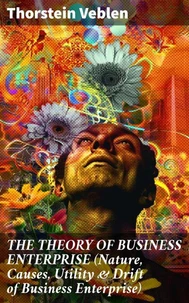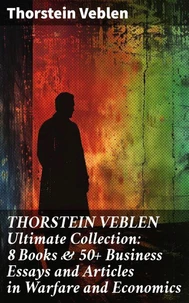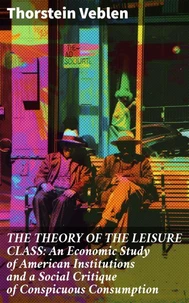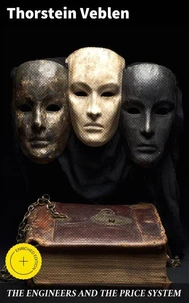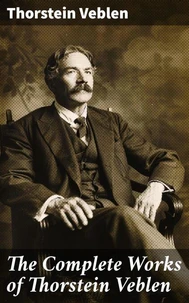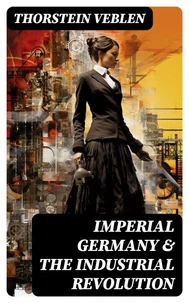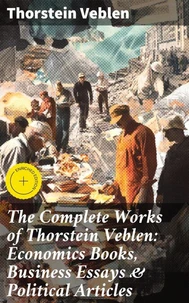The Theory of the Leisure Class
Par :Formats :
Disponible dans votre compte client Decitre ou Furet du Nord dès validation de votre commande. Le format ePub est :
- Compatible avec une lecture sur My Vivlio (smartphone, tablette, ordinateur)
- Compatible avec une lecture sur liseuses Vivlio
- Pour les liseuses autres que Vivlio, vous devez utiliser le logiciel Adobe Digital Edition. Non compatible avec la lecture sur les liseuses Kindle, Remarkable et Sony
 , qui est-ce ?
, qui est-ce ?Notre partenaire de plateforme de lecture numérique où vous retrouverez l'ensemble de vos ebooks gratuitement
Pour en savoir plus sur nos ebooks, consultez notre aide en ligne ici
- Nombre de pages256
- FormatePub
- ISBN859-65--4739011-4
- EAN8596547390114
- Date de parution13/11/2022
- Protection num.Digital Watermarking
- Taille365 Ko
- Infos supplémentairesepub
- ÉditeurDIGICAT
Résumé
In "The Theory of the Leisure Class, " Thorstein Veblen presents a critical examination of the social dynamics and economic behaviors of affluent societies in the late 19th century. Veblen employs a blend of sociological inquiry and economic analysis, utilizing a unique and engaging style marked by wit and irony. He introduces the concept of 'conspicuous consumption, ' arguing that the leisure class perpetuates societal stratification through visible displays of wealth and status.
This work is a seminal text in the realm of social theory, capturing the burgeoning tension between economic productivity and social hierarchies in an industrializing world. Thorstein Veblen, an American sociologist and economist, was deeply influenced by the rapid socio-economic changes of his time, including the rise of corporate capitalism. His background in philosophy and economics, coupled with a keen interest in social reform, motivated him to challenge the prevailing notions of capitalism and its ethical implications.
Veblen's critiques reflect a broader cultural critique of consumerism and the moral dilemmas associated with wealth in a modern society. This thought-provoking text is essential for readers seeking to understand the intricacies of consumer culture and the social implications of wealth. Veblen's insights remain relevant today, offering readers a lens through which to analyze the complexities of class and consumption in contemporary society.
This work not only enriches our understanding of economic behaviors but also encourages critical reflections on our own societal values.
This work is a seminal text in the realm of social theory, capturing the burgeoning tension between economic productivity and social hierarchies in an industrializing world. Thorstein Veblen, an American sociologist and economist, was deeply influenced by the rapid socio-economic changes of his time, including the rise of corporate capitalism. His background in philosophy and economics, coupled with a keen interest in social reform, motivated him to challenge the prevailing notions of capitalism and its ethical implications.
Veblen's critiques reflect a broader cultural critique of consumerism and the moral dilemmas associated with wealth in a modern society. This thought-provoking text is essential for readers seeking to understand the intricacies of consumer culture and the social implications of wealth. Veblen's insights remain relevant today, offering readers a lens through which to analyze the complexities of class and consumption in contemporary society.
This work not only enriches our understanding of economic behaviors but also encourages critical reflections on our own societal values.
In "The Theory of the Leisure Class, " Thorstein Veblen presents a critical examination of the social dynamics and economic behaviors of affluent societies in the late 19th century. Veblen employs a blend of sociological inquiry and economic analysis, utilizing a unique and engaging style marked by wit and irony. He introduces the concept of 'conspicuous consumption, ' arguing that the leisure class perpetuates societal stratification through visible displays of wealth and status.
This work is a seminal text in the realm of social theory, capturing the burgeoning tension between economic productivity and social hierarchies in an industrializing world. Thorstein Veblen, an American sociologist and economist, was deeply influenced by the rapid socio-economic changes of his time, including the rise of corporate capitalism. His background in philosophy and economics, coupled with a keen interest in social reform, motivated him to challenge the prevailing notions of capitalism and its ethical implications.
Veblen's critiques reflect a broader cultural critique of consumerism and the moral dilemmas associated with wealth in a modern society. This thought-provoking text is essential for readers seeking to understand the intricacies of consumer culture and the social implications of wealth. Veblen's insights remain relevant today, offering readers a lens through which to analyze the complexities of class and consumption in contemporary society.
This work not only enriches our understanding of economic behaviors but also encourages critical reflections on our own societal values.
This work is a seminal text in the realm of social theory, capturing the burgeoning tension between economic productivity and social hierarchies in an industrializing world. Thorstein Veblen, an American sociologist and economist, was deeply influenced by the rapid socio-economic changes of his time, including the rise of corporate capitalism. His background in philosophy and economics, coupled with a keen interest in social reform, motivated him to challenge the prevailing notions of capitalism and its ethical implications.
Veblen's critiques reflect a broader cultural critique of consumerism and the moral dilemmas associated with wealth in a modern society. This thought-provoking text is essential for readers seeking to understand the intricacies of consumer culture and the social implications of wealth. Veblen's insights remain relevant today, offering readers a lens through which to analyze the complexities of class and consumption in contemporary society.
This work not only enriches our understanding of economic behaviors but also encourages critical reflections on our own societal values.


